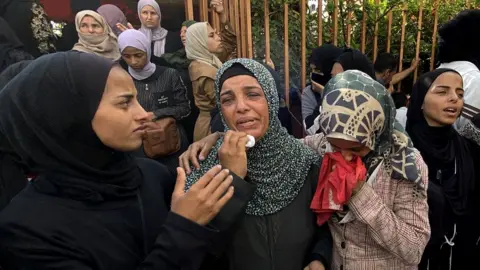- Audio
Blocked 10PlayMasque Publishing
时间:2010-12-5 17:23:32 作者:Economy 来源:Transportation 查看: 评论:0内容摘要:The book has been criticised for favouring London and the south-east.The book has been criticised for favouring London and the south-east.
They have names on them that make wine lovers go weak at the knees - Nuits-Saint-Georges, Echezeaux, Vosne-Romanée, Clos-Vougeot, and Chapelle-Chambertin.Ms Tremblay sells over half of her wine abroad, under the name Domaine Cecile Tremblay.

"For the United States, it's around 10% of the production; it's a big production for me!" she says.After threatening a 200% mark-up on alcohol from Europe, Donald Trump imposed a 20% tariff on practically all European Union products on 5 April.Four days later, he lowered this to 10%, with the threat that he'd hike it back up again to 20% in July, depending on how trade negotiations pan out. And now Trump is threatening a future tariff of 50% on all goods from the EU.

I ask Ms Tremblay if she's worried. "Yes, sure," she says, "As everybody is."But that is all she will say on the matter. French winemakers are walking on eggshells at the moment, fearful of saying anything that might aggravate the situation.

Perhaps their representatives will be more forthcoming? I get in my car and drive over to one of her neighbours - François Labet. He is the president of the Burgundy Wine Board, which represents this region's 3,500 winemakers.
"The US is the largest export market for the whole region. Definitely," he tells me. "They are the biggest in volume and the biggest in value."Trump has previously - and repeatedly - said he believes the two sides are making progress, despite ongoing fighting on the frontline and aerial attacks carried out in both Russia and Ukraine.
Separately on Wednesday, Putin also had a call with the US-born Pope Leo XIV.The Vatican confirmed that "particular attention" was paid to peace in the Ukraine war.
In Putin's call with Trump, the two leaders also discussed Iran. Trump said he believed the two "were in agreement" that "Iran cannot have a nuclear weapon".The US reportedly proposed Iran halt all production of enriched uranium - which can be used to make reactor fuel but also nuclear weapons - and instead rely on a regional consortium for supplies.
- 最近更新
- 2025-07-07 09:20:454,000-year-old Greek hilltop site mystifies archaeologists
- 2025-07-07 09:20:453 astronauts return to Earth after 6 months on China's space station
- 2025-07-07 09:20:45Israel lanza nueva operación militar en Gaza para presionar a Hamás a liberar rehenes
- 2025-07-07 09:20:45'Make Sure You Die Screaming' review: An absurd road trip novel for post-truth America
- 2025-07-07 09:20:45Judge overturns Michigan's 24-hour waiting period before an abortion
- 2025-07-07 09:20:45Soccer coach charged with teen's death accused of assaulting other teens
- 2025-07-07 09:20:45Meet Amy Allen, the songwriter behind the music stuck in your head
- 2025-07-07 09:20:45Christian Walker homer caps 6-run 7th for Astros in 6-3 win that ends Rangers' 6-game winning streak
- 热门排行
- 2025-07-07 09:20:45Federal Deposit Insurance Corporation
- 2025-07-07 09:20:45Soto falls deeper into slump with another hitless game in Mets' loss
- 2025-07-07 09:20:453% match on IRA contributions with Acorns Gold ($12 monthly fee)Acorns Later
- 2025-07-07 09:20:45Photos: Israeli airstrikes in Gaza kill dozens of people
- 2025-07-07 09:20:45Personal loan vs. home equity loan: Pros, cons and how they compare
- 2025-07-07 09:20:45NHL players are all about pregame routine, whether it's naps, walking the dog or eating same meal
- 2025-07-07 09:20:45How the Fed rate affects your student loans
- 2025-07-07 09:20:45Trump claims US is only country with birthright citizenship. It's not
- 友情链接
- Palestine Action are not terrorists. Israel is What’s next for US birthright citizenship after Supreme Court ruling? Ukraine summons top US diplomat after Washington halts some arms supplies Solitaire: GolfPlayMasque Publishing Dispatches from the living memory of trans people of color Real support at work means time off when you need it most Solitaire: La Belle LuciePlayMasque Publishing The best mosquito repellents that actually work, according to the pros Lobster Salad with Lemon-Basil Mayonnaise and Fresh Tomatoes Boyd sharp, Suzuki homers as Cubs deal Guardians 5th straight loss Report: Bucks dump NBA All-Star Lillard, acquire free agent Turner Turning point or pointless turn: Will DR Congo-Rwanda deal bring peace? Zohran Mamdani is wrong — of course billionaires should exist Vacuum deals are cleaning up for July 4 — and might beat Prime Day prices Spanish 21PlayMasque Publishing Why is Musk calling for a new America Party over Trump’s Beautiful Bill? Serious EatsWe taste-tested eight brands of iced teas — here are our favoritesRead the full story Solitaire CentralPlayMasque Publishing This screen-free toy is a hit with kids — and totally worth it for parents BlackjackPlayMasque Publishing Solitaire: ClassicPlayMasque Publishing The Take: Can the DRC-Rwanda deal deliver peace? The CEO — lifting the veil on Britain’s corporate elite EU blocks Britain’s attempts to join pan-European trading bloc Baccarat MiniPlayMasque Publishing Top Chef finalist Shuai Wang cooks Chinatown BBQ with a Lowcountry flair Solitaire: FreeCell ChallengePlayMasque Publishing The best hair growth vitamins and supplements, according to experts What’s next for US birthright citizenship after Supreme Court ruling? Dominoes: All FivesPlayMasque Publishing
